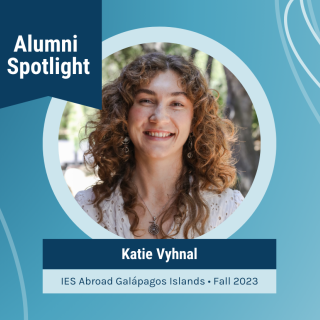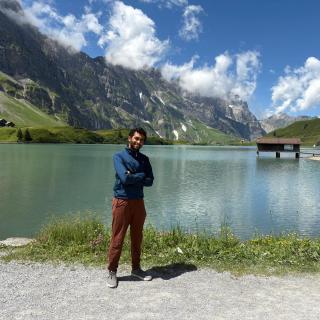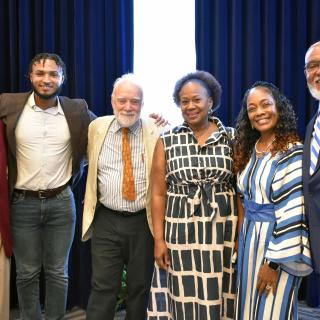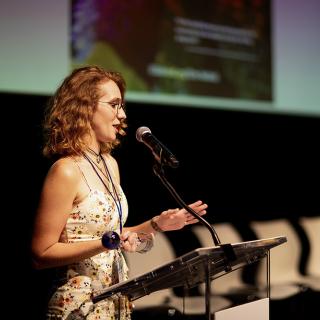 |
Meet Elizabeth Souder (Berlin | Academic Year 1996-97), Assistant Editorial Page Editor at The Dallas Morning News, and our July Alum of the Month. After studying abroad in Berlin, Elizabeth went on to work for the Dow Jones/Wall Street Journal in New York and was then transferred to Frankfurt, Germany, as a foreign correspondent. After three years in Germany, Elizabeth moved back to Texas where she landed her dream job as op-ed editor at The Dallas Morning News. In our interview, Elizabeth shares how studying abroad in Berlin helped prepare her for professional success and taught her valuable life lessons she still draws upon today. |
IES Abroad: As a student at the University of Texas at Austin, what led you to study abroad in Berlin?
Elizabeth Souder: After taking high school Spanish, I wanted to try something fresh. I’d done a short summer exchange trip to Trier, Germany, a few years earlier, and I found the Rhineland area to be delightful, so I settled on studying German.
I knew I wanted to study abroad for a year, and I went to the study abroad office in search of a program. This was in 1995, before everybody studied abroad, and the study abroad office was a tiny little closet in the basement of a dorm. My problem was that my German wasn’t very strong, so I didn’t qualify for a straight exchange program at a German university. I felt extremely frustrated by this, but the study abroad officer did some research and discovered IES Abroad. It was perfect; I could learn German with other Americans while also dipping my toe into German university courses.
IES Abroad: Looking back at your academic year of studying abroad in Berlin, what are some of your most significant memories?
ES: In Berlin, I learned to be independent, and I learned to find joy in my immediate situation.
The first day of life at IES Abroad Berlin was the gentlest because we were collected from the airport and driven to the IES Abroad Center, and then driven to our new homes. We each rented a room with a German family that had been vetted by the program.
But as of day two, we were no longer driven anywhere. We were told to meet at a certain landmark at a certain time, and to figure out how to get there. What a sense of accomplishment for each of us as we arrived. (This was before mobile phones, so navigating truly required reading German maps and signs, asking directions of the locals and communicating with hands and feet, as the Germans say.) The rest of the year, I achieved more and more of those everyday accomplishments, and it gave me the self-confidence that I could handle just about any problem that came my way.
I also, like everyone else, grappled with homesickness. I missed my family and friends, I missed Austin, the food, the music. But in Berlin, I made new friends and enjoyed a different, wonderful life. I realized that seeking out Tex-Mex in Berlin was ridiculous (though we did find a little, overpriced restaurant run by a guy from Houston), but while in Berlin, I should enjoy eastern Germany.
Then, when I went home and missed Berlin so much, I tried to focus on the people and places in front of me. It’s a lesson that has helped me feel happy at other times in life.
IES Abroad: What inspired you to become a journalist? Did your experiences, classes, and/or people you met in Berlin influence the type of journalism you wanted to pursue?
ES: From childhood, I always wanted to be a journalist. I had worked at the student newspaper in college for a couple of years before heading to Berlin. Before leaving Texas, I had contacted the foreign editor at The Dallas Morning News to offer myself as a freelancer. He was encouraging and put me in touch with the newspaper’s European reporter, who happened to be in Berlin. But then it was up to me to pitch some story ideas. And you know what? I failed. I offered up a bunch of dumb ideas that didn’t pan out.
In the course of this, I pursued an interview with a Texas radio DJ who had a blues show in Berlin. His show was wonderful – I learned about all sorts of American blues music and how that music traveled to Europe. Ed was a willing interviewee, but then he roped me in to discussions about starting an English language website, and, in the course of things, he told me all kinds of stories about his life as a music critic. That website never materialized, but it was fun to get to know a reporter who was pursuing an international career.
When IES Abroad arranged an internship for me at the Berliner Morgenpost family of newspapers, I finally got to make use of that interview with Ed. I wrote a small profile of him in German that had to be edited so heavily that they made me share a byline. But you know what? I did it.
IES Abroad: After graduation, how did you get your career started? Were there skills learned abroad that you applied in the early days of your career?
ES: After college, my goal was to return to Germany as a foreign correspondent. I applied to a bunch of news wires, but the first job offer I got was at the Lubbock Avalanche Journal. About as far from Europe as you can get. Still, I knew I needed to find joy in my surroundings, as I had learned in Berlin. Lubbock is a fascinating town with a distinct culture, and learning about West Texas was fun – great music, interesting people, and actual tumbleweeds. In my brief time in Lubbock, I even made a few lifelong friends.
Pretty soon, Dow Jones responded to my résumé, and I got hired to work the on-the-spot news desk in New York. This turned out to be about as far from the type of journalism I wanted to do as Lubbock was from Berlin. My job was to write up the news that came in from corporate press releases. There wasn’t much reporting involved. But, I had a great time. I learned how to identify news that would move the stock markets, I made a great network of journalist friends, and I met my future husband.
At the time, I was very clear with my boss that I wanted to work in one of the German bureaus and that I was fluent in German and eager to go. Some managers might have felt threatened by this – that their employee was trying to leave. But not this guy. He connected me with others in the office who had worked abroad. And when the Frankfurt bureau chief was visiting, he made sure to introduce me. It turns out that it’s not that easy to find an American business journalist who speaks German. So when a job became open, I got it.
IES Abroad: You worked for the Dow Jones/Wall Street Journal in New York and in Frankfurt, Germany. What was it like returning to Germany as a journalist?
ES: Frankfurt is very different from Berlin. Frankfurt is a small banking town in a region known for cobblestone towns of half-timber houses, while Berlin is a big city in the former East. It felt like I was returning to a different country.
Still, thanks to my experience in Berlin and traveling around the former East Germany, I felt comfortable enough in Frankfurt to jump right in to my job. I knew the basics of life in Germany, how to get around town and travel around Europe. I had a grasp of the landscape of my industry; I knew the names of the major news stations and papers, which were reliable and which published a Bikini Mädchen on the front page each day.
That knowledge basis came from my IES Abroad classes and internship. I did not know all the business and economics vocabulary in German, and I was an inexperienced translator. So I worked on those skills in Frankfurt, building on the basic language and cultural skills I had learned at IES Abroad Berlin.
IES Abroad: In 2005, you came back to Texas and joined The Dallas Morning News as a reporter. How did this job come about? What were some of the most interesting stories you covered?
ES: After three years in Frankfurt, I was ready to return to the United States. I think ex-pats have to decide at some point whether to embrace and internalize the foreign culture, almost becoming a citizen of the new country, or not. And I chose not to. So I returned to New York to cover aviation for Dow Jones.
I did that for a couple of years, got married, and started looking for a new opportunity. I was scouting for newspapers with strong business news coverage, and found that my hometown paper was among the best. I badgered the editor until he finally brought me in for an interview. I was hired to cover the energy industry, which I was doing back when people thought oil was about to run out. Instead, a new technology called fracking was being developed commercially in North Texas. I remember talking to my editor about how to spell fracking, since the petroleum engineers spelled it “fracing”, and that’s just ugly.
IES Abroad: Last year, you joined the editorial board. What do you love most about your current role?
ES: I have my dream job, which entails reading for long periods of each day and then arguing politics with really smart people. My job as op-ed editor is to work with outside opinion contributors, and it’s very rewarding to bring in articles that represent a broad spectrum of ideological political opinion. I also work with incredible journalists here in Dallas.
IES Abroad: Are there any skills you developed while studying abroad that you continue to draw upon today? Do you still use your German language skills?
ES: Studying abroad helped me learn self-reliance, flexibility, and the ability to find joy in my current situation. I experienced failure and frustration that I couldn’t solve, and I had to find peace with that.
And yes, I do still use my German from time to time, like when the German Ambassador to the United States came to the newspaper for an editorial meeting. One time a few years ago Westlb Bank made a (misguided) real estate investment in Dallas, and I was able to explain some documents for the reporter. German is a surprisingly useful language.
IES Abroad: What advice would you give to students who are thinking of studying or interning abroad?
ES: You should stay as long as you can possibly afford to stay and work hard to learn the local language. A full year is better than a semester, a semester is better than a summer. But even if you can only go for a summer, take language classes, challenge your brain to work toward fluency.
Also, pursue friendships with the Americans on the program. Consider them your fraternity brothers and sisters. IES Abroad students make a great future network. They are smart and adventurous, and they will go on to do big things. You are going to want to know these people.
Thank you, Elizabeth!
How will studying abroad prepare you for professional success? We can’t wait to find out. Check out all of our Alum of the Month profiles to see real examples of how study abroad changed the lives of our former students.





